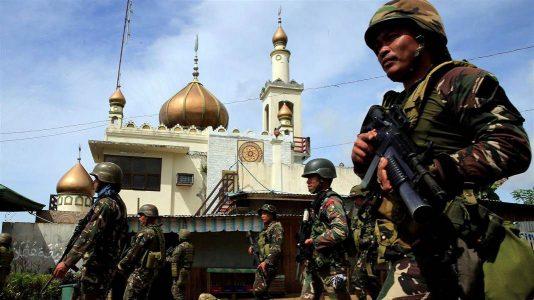
Islamic State terrorists claimed responsibility for the southern Philippine blast that killed at least 11 people
A bomb exploded in a van in the restive southern Philippines on Tuesday, killing 11 people at a military checkpoint in what militant group Islamic State called a suicide attack for which it claimed responsibility.
The blast took place on Basilan, the island stronghold of the Abu Sayyaf group notorious for kidnapping and banditry, which was the home of the former “emir” of Islamic State in Southeast Asia, killed last year by Philippine troops.
A suspected bomber, a soldier, five paramilitary troopers and four civilians, including a mother and her child, were killed and seven people were wounded in the blast, an army spokesman said.
Vehicle bombings are extremely rare in the Philippines, despite decades of separatist and Islamist violence that have destabilised the Mindanao region and lured foreign extremists.
In a statement carried by its Amaq news agency, Islamic State claimed responsibility for the suicide bombing attack, which it called “a martyrdom operation”.
Presidential spokesman Harry Roque condemned the bombing as a “war crime”, calling it “an illegal use of force, even in times of armed conflict”.
Tuesday’s explosion happened moments after troops stopped the vehicle and spoke to the driver, who was alone and probably detonated the bomb, the military said.
A soldier who witnessed the attack said in an interview on private-run DZMM radio that the driver spoke in an unfamiliar dialect and may have been foreign.
However, military spokesman Colonel Edgard Arevalo said security forces were investigating and there was no basis yet to conclude that the incident was a suicide bombing or had been carried out by a foreigner.
Intelligence indicated that militants planned to build homemade bombs and target army bases, he added.
Basilan is a no-go area for most Filipinos and Western countries typically warn citizens to stay away because of the presence of Abu Sayyaf and fierce military offensives against its fighters.
Abu Sayyaf is infamous for taking fishermen and crew from commercial ships as hostages and beheading Western captives for whom ransom is not paid.
President Rodrigo Duterte was on a neighbouring island at the weekend and has offered peace talks with several Abu Sayyaf factions.
Duterte’s offer came two days after he approved a law to allow minority Muslims in the region to create a new autonomous area with its own political and economic powers.
Tuesday’s blast was a “horrifying attack” and a “cowardly act” said opposition lawmaker Senator Risa Hontiveros, a backer of the autonomy law who urged that the attack should not derail moves towards self-determination for the region’s Muslims.
The bombing was a sign extremists were bent on sabotaging a peace effort that had a chance of success, said security expert Rommel Banlaoi.
“These pro-Islamic State militants will pose a tremendous challenge for the implementation of the Bangsamoro Organic Law,” he said, referring to the autonomy law.
Source: Reuters





